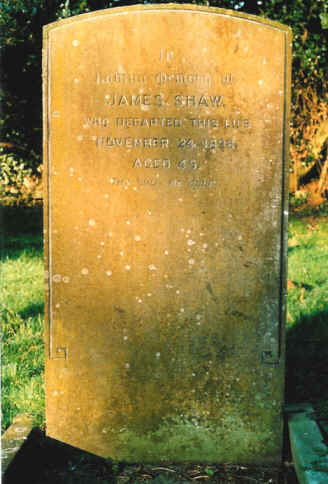
The Death of a Landlord
James Shaw, was born in Blackthorn, near Bicester. In the 1881 census, James is recorded as a butcher and innkeeper at the Kings Head, where he lived with his twenty-two-year-old wife, Emily of Bletchingdon, their son George, aged two months, and Sarah King, a servant from Luggershall. His stay at the Kings Head proved rather unluckier than that of Robert Greaves.
On 15 September 1898, Mrs Freeman of Little Tingewick heard a cart coming along the road and then a sound as though the horse had stumbled. She went towards the cottage door and saw the horse starting at a gallop. Just as she reached the door, the horse fell and she saw James Shaw fall head first out of the cart.
Forty-six-year-old James was a large man, weighing fifteen or sixteen stones.He was thrown over the horse’s shoulders and crashed onto the road, with his head towards the horse. As he lay on his left side, the horse ran away and the right wheel of his cart ran over the lower part of his stomach. Shaw was doubled up with pain but he managed to creep on hands and knees into Mrs Freeman’s cottage. She found him to be in dreadful pain and exhibiting symptoms of internal injuries. Abedside chair was brought down to the door of the cottage and neighbours lifted the injured man into it, where he remained for nearly an hour in great pain. A wagonette was fetched and he was taken to his home at the Kings Head.
James remained ill for ten weeks and in great pain despite frequent doses of opium. He died on 24 November and is buried with his wives and child in Finmere churchyard.
|
We have to record the death of Mr James Shaw, innkeeper and butcher of Finmere. It appears that ten weeks back, he was out on business, when his horse stumbled, throwing him out of the cart. The horse recovered itself before Mr Shaw could do so, and most unfortunately one of the wheels of the cart passed over his body. He was taken home and attended by Dr Cheeseman, who found that he had severe internal injuries, and no hope was held out of his recovery… he died a few minutes to midnight on Thursday. (Buckingham Advertiser, 28 November 1898) |
An inquest, held in the Council Chamber in Buckingham, heard evidence from Dr Cheeseman and Dr Duke. They agreed that death was caused by a mass of coagulated blood, weighing upwards of 1lb (0.5kg), which had obstructed passage from the bowel and the bladder. The jury returned a verdict of accidental death.
James had taken out accident insurance for £500 with the Railway Passengers’ Assurance Society. The Society challenged the jury’s verdict and refused the claim from his widow, arguing that the death had been caused by disease. A panel of three distinguished medical arbitrators in London heard the dispute in December 1899, a year after James’s death. It was a lengthy hearing and the expert witnesses argued about the coagulated blood: was this the result of disease or the accident? The arbiters ruled that the accident was the cause and James’ third wife, Elizabeth, received her compensation.
[The last line of this text corrects the Millennium History. Our thanks to Julie Kerrigan for this correction.]